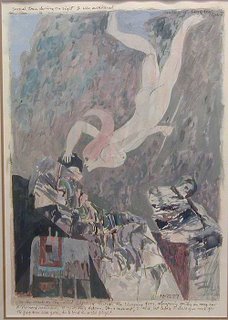The Muse Whisperer
 If you’ve been around for any length of time, you know I have a puppy. I’ve become hooked on The Dog Whisperer television show, where Cesar Milan shows you just have to act like your dog's pack leader and she'll pretty much roll over, heel and knead bread for you anytime you want.
If you’ve been around for any length of time, you know I have a puppy. I’ve become hooked on The Dog Whisperer television show, where Cesar Milan shows you just have to act like your dog's pack leader and she'll pretty much roll over, heel and knead bread for you anytime you want.I’ve also glommed onto a modernized concept of the Freudian super-ego called the “inner mother.” Clarissa Pinkola Estés' coined the term to name the inner voice that guides you to do and say the “right” things, to make the choices that are ultimately best for you and yours. This is the little voice that nudges you to apologize because you know it's the right thing to do, even if you are still mad. It's also the voice that says, "no more brownies," even when your hand is halfway to the pan and your mouth is watering. The voice isn't always welcome, but it serves a vital purpose in keeping us from wandering the world doing as we please with no thought to the consequences.
Hang with me here for a second as I superglue these two seemingly unrelated things together.
Every writer has an inner voice, too, a "writer within" who wants your manuscript not only to be finished but to sparkle. This writerly voice says “sit” when you approach the computer. It says “stay” when your lessor-self wants to scamper off into the Internet weeds. And because the writer within means what she says, you listen...unless she doesn't, and unless you don't.
What, then, can you do if you have trouble sitting and staying?
Estes says a weak inner voice usually means a person had poor role models growing up, leaving a "stone child" in place of an inner mother. A troubled writer might also be said to have a poorly developed inner voice, resulting in a "stone muse" instead of a functional one. The cure--no shocker here--is to improve not only the inner voice but the response to it.
Here’s where I turn from the inner mother concept to Cesar Milan’s. Granted, we're not canines, but what Cesar teaches dogs and their owners is discipline, and that's what a stone muse and an unheeded writer within need the most. For the dog owner, discipline means always saying what you mean and meaning what you say with your dog; for the dog, discipline means heeding the owner's command every single time. A dog who has had a weak owner takes full advantage--she's off the leash metaphorically if not physically. A stone muse is not unlike a leashless pooch, and she needs just as much control. Controlling the stone muse means you don't vacillate; you set a reasonable course, begin it, and then keep her glued to it as if it's her personal savior--because, really, it is. But be prepared: she will wear you down and test you at every turn until she knows you say what you mean and mean what you say.
So.
SIT. Just do it.
Now for a trick. Open the document for your wip.
STAY. WRITE.
But I want to look at the picture of the day. It’ll just take a second.
NO. Don’t touch that link.
STAY. WRITE.
You-got-mail just chimed. I must check—
NO. STAY. WRITE.
I have to call my friend about—
NO. STAY. WRITE.
We're out of bread. I should-
NO. STAY. WRITE.
It's like anything else: If you want something, you have to make it happen. Do it. Keep doing it. Set limits and stick to them. Watch for any signs of wavering from the course. Call yourself on your impulses before you veer off, and if you do stray, take to the path again ASAP. A simple-difficult key, I know, but the alternative is a stone muse who gains strength every time you cave to her whims and ends up calling the shots completely.
Remember: It isn’t your inner writer who needs to change; it’s how you control her.

 posted by Therese Walsh at
posted by Therese Walsh at 


4 Comments:
I give myself time to write and when I find it hard to keep from distractions, I force myself to use the AlphaSmart AWAY from my computer. That way I've no way to check email etc *g*.
Hey, Eric, I don't in any way mean writers should take a whip to creativity, because that's a sure way for passion-driven writing to turn into stressful work. I do believe, however, that when the writer within WANTS to move forward but the daily motivation just doesn't materialize, it's time to unteach the stone muse's laggard ways. To my mind, this is different from having a mental block or hitting trouble with a particular scene and not being able to write for a few days (though even then you might see and cure the problem if you write through it).
I had never heard of Unstuck before, so I looked it up. (Folks can check out the site at http://www.unstuck.com/) It's said to be "an interactive web site built for the official launch of UNSTUCK, a new book by Keith Yamashita and Sandra Spataro. The web site is filled with information to help you move forward when everything seems to be headed in reverse. We invite you to explore the site and gather tools, techniques, and inspiration to help you as a leader."
I especially like Unstuck's page about the "Serious Seven" reasons you might be stuck: http://www.unstuck.com/diagnose/serious7/
Maybe this is something we should add to Box Cutters? Thanks for the tip!
Great post, Therese!
Lately I've been working on another aspect of "mothering the muse": reminding her, as I would my kids when they're trying to learn something new, that it's OK to make mistakes.
Sounds simplistic but as adults we don't always give ourselves that slack.
Eric, thanks for clarifying! I went back to the site I thought you were talking about, and I see on closer inspection that they're targeting groups of workers not writers. Oops!
Tess, I like your idea: don't invite the temptations into your workspace in the first place. (Kind of like not buying the ice cream at the grocery store when you want to fit into that bathing suit this summer, huh? ;) )
Elena, I agree with your comment about allowing the muse to make mistakes - very important. My muse gets very stubborn about things sometimes: if it's not pretty enough, she digs in her heels. The alphasmart is great for this syndrome, too, since you can't see more than 4 lines of your text at a time.
Post a Comment
<< Home